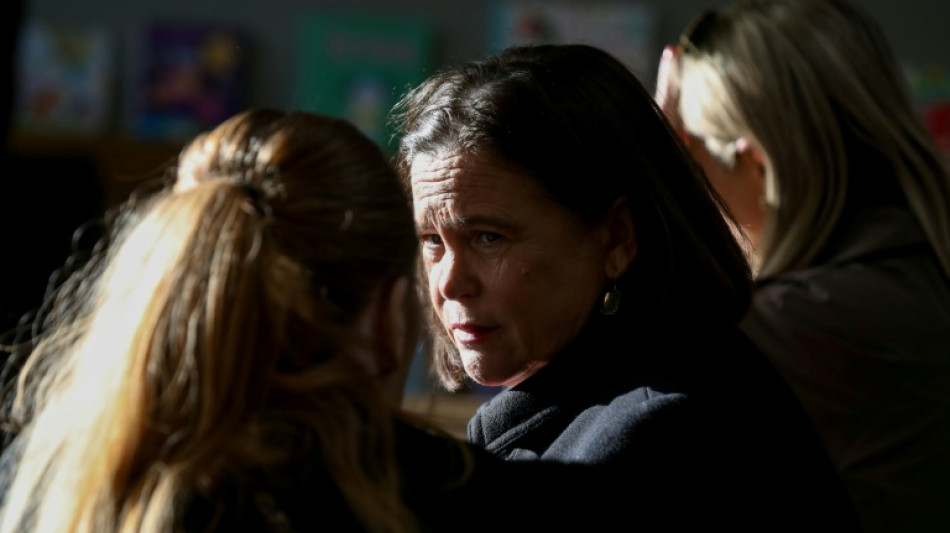

Sinn Fein hope election will propel it to power in Ireland
Promises made by the Sinn Fein pro-Irish unity party to tackle a housing and cost-of-living crisis and stop young people leaving the country have bolstered its popularity ahead of a general election on Friday.
Party president Mary Lou McDonald is hoping "momentum" among young voters can propel it to power but obstacles remain.
"It's now very clear that there can be government beyond Fine Gael and Fianna Fail, that for the first time we can have a government led by Sinn Fein," she said at a campaign event in Dublin Monday, referring to the two ruling parties who have long dominated the Irish state.
"It is a transformational opportunity, we are ready, we are good to go, and we will ask the people... to give us that chance," she told reporters.
McDonald, 55, succeeded Gerry Adams as Sinn Fein president in 2018, becoming the leftist party's first leader not connected to Northern Ireland's Troubles, the decades-long sectarian conflict over British rule.
The shift broadened the appeal of the former political wing of the paramilitary Irish Republican Army (IRA), and saw it win the popular vote and its biggest haul of parliamentary seats at the last election in 2020.
Sinn Fein soared to more than 30 percent in the polls last year and appeared destined for power as the first left-wing government since Ireland gained independence from Britain in 1921.
McDonald was poised to become Ireland's first female taoiseach, or prime minister.
But that support plunged over the past year after it backed the government in a failed referendum on constitutional references to the family and care in the home.
It also lost working class support over a stance on immigration seen as too soft, slumping to around 11 percent at local elections this year.
- Comeback -
Sinn Fein is now neck-and-neck with the other main parties -- the ruling centre-right coalition of Fine Gael and Fianna Fail -- each polling around 20 percent.
McDonald has been seen as more engaging with voters than Fine Gael's outgoing taoiseach Simon Harris and Fianna Fail's Micheal Martin.
"Sinn Fein are the only party that can give us a change of government, I think it's well overdue after 100 years of Fianna Fail and Fine Gael," Ciara Daly, a 24-year-old digital media worker, told AFP in Dublin.
"The housing crisis, homelessness, all my friends are emigrating, if Sinn Fein don't get into government... what am I going to do next because I can't stay in this country."
Fine Gael support has been hit in the past week after a campaign blunder by Harris who appeared to dismiss an upset disability sector worker during a supermarket meeting.
But many voters remain sceptical about Sinn Fein because of its past.
"I don't believe that Sinn Fein have distanced themselves enough from the antics of the IRA, the bombings and all of that for them to have my trust as a party," said Margaret Philbin, 65, in Dublin.
- All-Ireland party -
If she becomes premier McDonald has pledged to immediately push for a referendum on Irish unification by 2030.
Sinn Fein is the largest Northern Ireland party in the UK parliament in London -- although it does not take up its seats -- and the largest at council level and in the devolved Northern Ireland Assembly.
Earlier this year Sinn Fein's deputy leader Michelle O'Neill became the first Irish nationalist First Minister of the British region.
Lisa Keenan, a political scientist at Trinity College Dublin, said having McDonald as prime minister would be "a very significant moment for Irish politics".
"It would see Sinn Fein –- a genuinely all-Ireland party –- in power on both sides of the border," she told AFP.
"It would also bring the issue of a united Ireland centre-stage in the Republic in a way that it has not been for decades."
However, Sinn Fein's path to power remains steep.
Even if it won the largest share of votes on Friday, it could struggle to find enough partners to form the next government.
Fine Gael and Fianna Fail -- which also support Irish unification -- have both ruled out a coalition with Sinn Fein.
"Unless the polls shift substantially, and Fianna Fail changes its position on Sinn Fein, it is very hard to see McDonald heading up a government this time around," said Keenan.
I.Barone--IM



